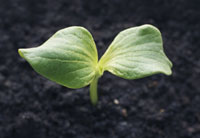悲伤的音乐能使人落泪,欢快激昂的曲调则会让人精神振奋。音乐对人有影响已经是广为接受的一种观点。可是,说音乐对植物的生长也有影响,你会相信吗?

In 1973, a woman named Dorothy Retallack published a small book called The Sound of Music and Plants. Her book detailed experiments that she had been conducting at the Colorado Woman’s College in Denver using the school’s three Biotronic Control Chambers. Mrs. Retallack placed plants in each chamber and speakers through which she played sounds and particular styles of music. She watched the plants and recorded their progress daily. She was astounded(大吃一惊) at what she discovered.
Her first experiment was to simply play a constant tone. In the first of the three chambers, she played a steady tone continuously for eight hours. In the second, she played the tone for three hours intermittently, and in the third chamber, she played no tone at all. The plants in the first chamber, with the constant tone, died within fourteen days. The plants in the second chamber grew abundantly and were extremely healthy, even more so than the plants in the third chamber. This was a very interesting outcome, very similar to the results that were obtained from experiments performed by the Muzak Corporation in the early 1940s to determine the effect of "background music" on factory workers. When music was played continuously, the workers were more fatigued and less productive, when played for several hours only, several times a day, the workers were more productive, and more alert and attentive than when no music was played.
For her next experiment, Mrs. Retallack used two chambers (and fresh plants). She placed radios in each chamber. In one chamber, the radio was tuned to a local rock station, and in the other the radio played a station that featured soothing "middle-of-the-road" music. Only three hours of music was played in each chamber. On the fifth day, she began noticing drastic changes. In the chamber with the soothing music, the plants were growing healthily and their stems were starting to bend towards the radio! In the rock chamber, half the plants had small leaves and had grown gangly(细长的), while the others were stunted(矮小的). After two weeks, the plants in the soothing-music chamber were uniform in size, lush and green, and were leaning between 15 and 20 degrees toward the radio. The plants in the rock chamber had grown extremely tall and were drooping, the blooms had faded and the stems were bending away from the radio. On the sixteenth day, all but a few plants in the rock chamber were in the last stages of dying. In the other chamber, the plants were alive, beautiful, and growing abundantly.
Mrs. Retallack’s next experiment was to create a tape of rock music by Jimi Hendrix, Vanilla Fudge, and Led Zeppelin. Again, the plants turned away from the music. Thinking maybe it was the percussion in the rock music that was causing the plants to lean away from the speakers, she performed an experiment playing a song that was performed on steel drums. The plants in this experiment leaned just slightly away from the speaker; however not as extremely as did the plants in the rock chambers. When she performed the experiment again, this time with the same song played by strings, the plants bent towards the speaker.
Next Mrs. Retallack tried another experiment again using the three chambers. In one chamber she played North Indian classical music performed by sitar(西他) and tabla(手鼓), in another she played Bach organ music, and in the third, no music was played. The plants "liked" the North Indian classical music the best. In both the Bach and sitar chambers, the plants leaned toward the speakers, but he plants in the Indian music chamber leaned toward the speakers the most.
She went on to experiment with other types of music. The plants showed no reaction at all to country and western music, similarly to those in silent chambers. However, the plants "liked" the jazz that she played them. She tried an experiment using rock in one chamber, and "modern" classical music of negative composers Arnold Schuberg and Anton Webern in another. The plants in the rock chamber leaned 30 to 70 degrees away from the speakers and the plants in the modern classical chamber leaned 10 to 15 degrees away.
(来源:funtrivia.com 英语点津 Helen 编辑)
我要了解更多趣味百科知识